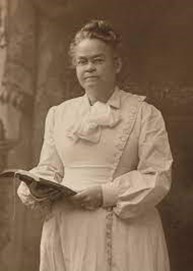
Bettina Zvanut at the Commerce Public Library and I have been working on information of two interesting women. Recently, Bettina put together this piece that I am submitting. Maybe someone can add to our knowledge of Etta Booth Mayo of Commerce and Carrie Nation, a noted women’s suffrage and supporter of the temperance movement. While we know that Carrie Nation was in Commerce, we don’t know whether she made it to Greenville.
In 1974, Catherine Opal Williams, retired Head Librarian for what is today Texas A&M Commerce, began a searched to verify that Mrs. Nation was in Commerce. She contacted the New York Public Library, the Kansas State Historical Society, the Schomburg Center for Research in Black Culture, and the Medicine Lodge Library in Kansas. None of the institutions could assist but did verify that Carrie Nation was traveling throughout the Southwest giving lectures at that time and had been in Tulsa, Oklahoma in February.
Ms. Williams did not get the information she was seeking, but she had an interesting clue. In 1905, Etta Booth Mayo, an educated woman and early feminist, taught music classes at East Texas Normal College where her husband, Professor William Leonidas Mayo, founded the college. Mrs. Mayo was very interested in women’s suffrage, and the temperance movement, corresponding with both progressive organizations. Over time, Mrs. Mayo became concerned about the many saloons in Commerce and their effects of the students at the college. In a letter written by Catherine Opal Williams, she quotes from a manuscript written by Gladys Mayo, Etta Booth Mayo’s daughter.
“Saloons were numerous in the little town of Commerce . . . They presented a problem to a growing town with a college. My mother appealed to Frances E. Willard, Director of the Temperance Movement in the United States for advice. Their correspondence lent hope and inspiration to my parents and to the townswomen.
Later a militant crusader appeared on the scene in the person of Carrie A. Nation. She must have come to Commerce upon my mother’s invitation, and for some time she made her Texas headquarters in our dormitory.”
Ms. Williams may have found further collaboration if she studied the microfilm at the Commerce Public Library because the Commerce Journal wrote a review of Mrs. Nation’s lecture to the students at East Texas Normal College on March 31, 1905.
“Tuesday morning the students at the East Texas Normal College had the privilege of listening to a woman of almost world renown . . . Instead of a harsh, raving speaker, the idea many have of her, Mrs. Nation is a cool, calm, logical, yet eloquent speaker. After being introduced by Professor Mayo, Mrs. Nation began her lecture, which was greatly appreciated by the students . . . Purify the home, bring the child up in a Christian way, and that child will kill to liquor in the United States.” She says, “We must have a national prohibition of the liquor curse, making it a crime to manufacture, barter, sell, or give away that which causes ¾ of all crime, murdering a hundred thousand every year.”
As you can see, Ms. Williams’ suspicions were correct, Carrie Nation did come to Commerce, Texas, and lectured the youth here without the aid of a hatchet! Prohibition would not become law until 1920 with the passage of the 18th Amendment. Many other women had continued Carrie Nation’s quest until no alcohol was sold legally in the U. S. However, the legislation caused the development of other criminal syndicates and it was difficult to enforce. Prohibition was eventually repealed by the 21st Amendment.
